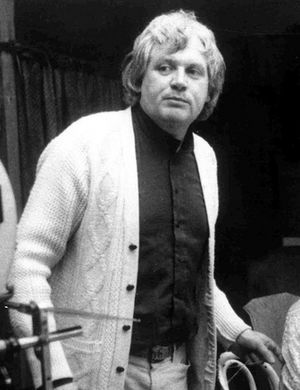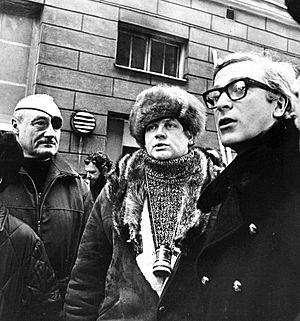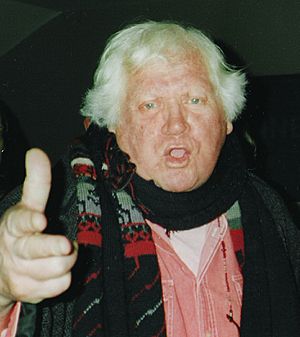Ken Russell facts for kids
Quick facts for kids
Ken Russell
|
|
|---|---|

Russell in 1971
|
|
| Born |
Henry Kenneth Alfred Russell
3 July 1927 Southampton, Hampshire, England
|
| Died | 27 November 2011 (aged 84) Lymington, Hampshire, England
|
| Occupation |
|
| Years active | 1956–2011 |
| Spouse(s) |
Shirley Ann Kingdon
(m. 1956; div. 1978)Vivian Jolly
(m. 1983; div. 1991)Hetty Baynes
(m. 1992; div. 1999)Lisi Tribble
(m. 2001) |
| Children | 8 |
Henry Kenneth Alfred Russell (born 3 July 1927 – died 27 November 2011) was a famous British film director. He was known for his groundbreaking work in both television and movies.
Russell often made films that were new versions of books or stories, especially biographies of famous composers from the Romantic era. He started his career directing for the BBC, where he created unique and imaginative films about the lives of composers. He also directed many feature films for big studios and as an independent filmmaker.
Some of his most well-known films include the Oscar-winning Women in Love (1969), The Devils (1971), The Who's Tommy (1975), and the science fiction film Altered States (1980). He also directed several movies about classical music composers, such as Elgar, Delius, Tchaikovsky, Mahler, and Liszt.
Film critic Mark Kermode once said that Russell showed how British cinema could be exciting and imaginative, not just focused on everyday life. Later in his career, Russell made smaller, experimental films that were still very bold and original.
Contents
Ken Russell's Early Life
Russell was born in Southampton, Hampshire, England, on 3 July 1927. He was the older of two sons. As a child, he spent a lot of time at the cinema with his mother. He said that the films Die Nibelungen and The Secret of the Loch were early inspirations for him.
He went to private schools and later studied photography at Walthamstow Technical College, which is now part of the University of East London.
Joining the Military
When he was younger, Russell dreamed of becoming a ballet dancer. However, he ended up joining the Royal Air Force and later the British Merchant Navy. After short careers in dance and photography, he started working in television.
His Photography Work
In 1954, Russell began working as a freelance photographer, focusing on local topics. His series of "Teddy Girl" photographs were published in Picture Post magazine in 1955. He continued to work as a freelance documentary photographer until 1959.
During this time, he also started directing short films. His short film Amelia and the Angel (1959) received a lot of praise, which helped him get a job at the BBC.
Russell's Television Work
Documentaries and Early Success
Between 1959 and 1970, Ken Russell directed many arts documentaries for popular TV shows like Monitor and Omnibus.
He made films about various artists and topics, including Poet's London (about John Betjeman), Portrait of a Goon (about Spike Milligan), The Strange World of Hieronymus Bosch, and Shelagh Delaney's Salford.
Russell's films started to become longer. His film Elgar (1962), about Sir Edward Elgar, was very well-liked. It was the first time a TV arts show focused entirely on one artist, rather than being a mix of different topics. It was also new because it used actors to show different stages of a character's life, instead of just photos or old footage.
First Feature Films and Growing Fame

Russell's first full-length movie was French Dressing (1964), a comedy. It wasn't very successful, so Russell went back to working for the BBC. For TV, he made films like Bartok (1964) about Béla Bartók. In 1964, he planned to make a movie based on Anthony Burgess's A Clockwork Orange, but the British Board of Censors advised against it, so he stopped the project.
Russell had a big success with the TV movie The Debussy Film (1965), starring Oliver Reed as Claude Debussy. Another well-received film was Always on Sunday (1965), about Henri Rousseau.
He also directed Isadora Duncan, the Biggest Dancer in the World (1967), about the famous dancer Isadora Duncan.
Russell's television work led producer Harry Saltzman to hire him to direct a major film, Billion Dollar Brain (1967), which starred Michael Caine. After this, he returned to television for films like Dante's Inferno (1967) and Song of Summer (1968), about composer Frederick Delius. He once said Song of Summer was the best film he ever made.
Ken Russell as a Feature Film Director
The Success of Women in Love
In 1969, Russell directed Women In Love, which many consider his most important film. It was based on D. H. Lawrence's novel and told the story of two artistic sisters in Britain after World War I. The film starred Glenda Jackson, Oliver Reed, Jennie Linden, and Alan Bates. Women in Love received four Oscar nominations, including one for Russell as Best Director.
The film was also praised for its costume designs by Russell's first wife, Shirley, and its beautiful use of color and cinematography.
Russell then made the TV film Dance of the Seven Veils (1970), which aimed to show Richard Strauss as a supporter of Nazism. The Strauss family was very upset and removed all music rights, which meant the film couldn't be shown for many years.
Three Films in 1971
After Women in Love, Russell directed several new and often talked-about films. The Music Lovers (1971) was a biography of Tchaikovsky, starring Richard Chamberlain as the composer and Glenda Jackson as his wife.
He then directed The Devils (1971). This film was so controversial that the production company, Warner Bros., would only release it after making cuts. It was inspired by a book about events in Loudun, France, and starred Oliver Reed as a priest who challenged powerful figures. The original, uncut version of the film was rarely shown for many years.
Russell followed The Devils with a new version of the musical The Boy Friend (1971). He cast the model Twiggy in the lead role, and she won two Golden Globe Awards for her performance.
Mid-1970s Films
Russell wanted to make films about famous figures like Édith Piaf or King Ludwig of Bavaria, but these projects didn't happen. Instead, he helped fund Savage Messiah (1972), a film about the artist Henri Gaudier-Brzeska, who died in World War I. The film starred Dorothy Tutin, Scott Antony, and Helen Mirren.
He also worked on Mahler (1974), starring Robert Powell as the composer Gustav Mahler.
In 1975, Russell directed the star-filled film version of The Who's rock opera Tommy. It starred Roger Daltrey, Ann-Margret, Oliver Reed, Elton John, Tina Turner, Eric Clapton, and Jack Nicholson, and was a huge success, staying at the No.1 spot for fourteen weeks.
Soon after Tommy, Russell began working on Lisztomania (1975), another film starring Roger Daltrey, with music by Rick Wakeman. Both Tommy and Lisztomania were important for improving movie sound in the 1970s, as they were among the first films to use Dolby sound.
Russell's next film, the biography Valentino (1977), starred Rudolf Nureyev as Rudolph Valentino. It was popular in Britain but not a big hit in America. After this, he found it hard to get new directing jobs in Hollywood.
Back to Television and Altered States
Russell returned to television to make William and Dorothy (1978), about William Wordsworth and his sister, and The Rime of the Ancient Mariner (1978), about Samuel Taylor Coleridge.
He then went to Hollywood to direct Altered States (1980), a science fiction film with an innovative Oscar-nominated music score. The film was moderately successful and was praised by critics who had sometimes been critical of Russell's earlier work.
Even after the success of Altered States, Russell faced challenges in making his next film. He was involved in a project to film Evita for over a year but left the project. However, Russell found new artistic energy when he was offered the chance to direct opera.
Russell's next film after Altered States was The Planets (1983), a 53-minute film based on Gustav Holst's famous musical suite. This film was made for The South Bank Show, a British arts program. It was a visual collage that matched existing footage to each of the seven parts of Holst's music.
For The South Bank Show, Russell also made Vaughan Williams: A Symphonic Portrait (1984) about Ralph Vaughan Williams.
Russell returned to feature films with the thriller Crimes of Passion (1984), starring Anthony Perkins and Kathleen Turner. It wasn't a big box office hit but became very popular on video.
Opera and Music Videos
In 1985, he directed Gounod's opera Faust at the Vienna State Opera. He also directed successful productions of La bohème and Madama Butterfly.
Russell also started a company called Sitting Duck to make music videos. He directed videos like "Nikita" for Elton John and "Phantom of the Opera" for Andrew Lloyd Webber.
Films for Vestron Pictures
Russell directed Gothic (1986), which was about the night Mary Shelley told the story of Frankenstein. It was popular on video, and the company Vestron Pictures signed Russell to direct three more films.
For British TV, Russell made Ken Russell's ABC of British Music (1988) and A British Picture (1989).
As part of his deal with Vestron, he directed Salome's Last Dance (1988), a film inspired by Oscar Wilde's play Salome. He also made The Lair of the White Worm (1988), based on a story by Bram Stoker, and The Rainbow (1989), another adaptation of a D. H. Lawrence novel, which was a prequel to Women in Love.
Russell also directed the opera Mefistofele (1989).
Later Career
In the 1990 film The Russia House, starring Sean Connery and Michelle Pfeiffer, Russell had one of his first notable acting roles. After this, he occasionally acted in films.
The film Prisoner of Honor (1991) allowed Russell to explore themes of injustice through a true story about the Dreyfus affair in France. The movie starred Richard Dreyfuss as Colonel Georges Picquart, an investigator who uncovered a wrongful accusation against a Jewish officer, Captain Alfred Dreyfus.
By the early 1990s, Russell was very well-known, and his personality sometimes got more attention than his recent films. He often had to use his own money to keep making movies. Much of his work after 1990 was for television, including documentaries for The South Bank Show.
Prisoner of Honor (1991) was Russell's last film with Oliver Reed. His final film with Glenda Jackson before she became a politician was The Secret Life of Arnold Bax (1992).
He directed Lady Chatterley (1993), The Mystery of Dr Martinu (1993), a version of Treasure Island (1995), and Mindbender (1995) about Uri Geller.
In May 1995, Russell was honored with a special showing of his work in Hollywood by the American Cinematheque. He attended the festival and talked about his films with the audiences.
Later films include Dogboys (1998), The Fall of the Louse of Usher (2002), and Elgar: Fantasy of a Composer on a Bicycle (2002).
Russell had small roles in the 2006 films Brothers of the Head and Colour Me Kubrick. He also directed a part of the horror film Trapped Ashes (2007).
Some of his later independent films, like The Lion's Mouth (2000) and The Fall of the Louse of Usher (2002), were made with lower budgets and often filmed at his own home.
In 2003, he was a judge at the 25th Moscow International Film Festival. He also acted in an episode of the TV series Waking the Dead, playing an older film director.
From 2004, Russell was a visiting professor at the University of Wales, Newport Film School, where he advised students on their films. He also presented awards to graduate filmmakers.
Russell was appointed a visiting fellow at Southampton Solent University and later at the University of Southampton in 2007. His arrival was celebrated with a screening of a rare version of The Devils.
In 2007, Russell produced A Kitten for Hitler, a short film.
Russell joined the British reality TV show Celebrity Big Brother in January 2007. He was the oldest contestant at 79 years old and left the show voluntarily after about a week.
In 2010, Russell and his wife, Lisi Tribble, went on a tour across North America. He received a Lifetime Achievement Award at the Fantasia International Film Festival and had many of his films shown at festivals in Montreal, New York, and Los Angeles.
In 2008, he made his New York directing debut with the play Mindgame at the SoHo Playhouse.
Ken Russell's Personal Life
Ken Russell was married four times. His first marriage was to costume designer Shirley Kingdon from 1958 to 1978, and they had four sons and a daughter. He was married to Vivian Jolly from 1984 to 1991, and they had a son and a daughter. His third marriage was to actress and ballerina Hetty Baynes from 1992 to 1997, and they had one son. All three of these marriages ended in divorce. In 2001, he married American actress and artist Elize "Lisi" Tribble, and they remained married until his death.
His Death
Ken Russell passed away on 27 November 2011, at the age of 84, after experiencing a series of strokes. He was survived by his wife and eight children.
His Writings
Besides books about filmmaking, Russell also wrote his autobiography, A British Picture: An Autobiography (1989). He also published six novels, including four about the lives of composers like Ludwig van Beethoven, Johannes Brahms, Edward Elgar, and Frederick Delius.
His science-fiction novel Mike and Gaby's Space Gospel was a new take on the story of Genesis. His last novel, Violation (2006), was also science fiction.
At the time of his death, he wrote a column for The Times newspaper.
Selected Films Directed by Ken Russell
| Year | Title | Director | Writer | Producer | Notes |
|---|---|---|---|---|---|
| 1964 | French Dressing | Yes | No | No | |
| 1967 | Billion Dollar Brain | Yes | No | No | |
| 1968 | Song of Summer | Yes | Yes | Yes | Television Film |
| 1969 | Women in Love | Yes | No | No | Nominated- Academy Award for Best Director Nominated- Golden Globe Award for Best Director |
| 1971 | The Music Lovers | Yes | No | Yes | |
| The Devils | Yes | Yes | Yes | Won- National Board of Review Award for Best Director Won- Venice Film Festival for Pasinetti Award |
|
| The Boy Friend | Yes | Yes | Yes | Won- National Board of Review Award for Best Director Nominated- Writers Guild of America Award for Best Adapted Screenplay |
|
| 1972 | Savage Messiah | Yes | No | Yes | |
| 1974 | Mahler | Yes | Yes | No | |
| 1975 | Tommy | Yes | Yes | Yes | Nominated- Golden Globe Award for Best Motion Picture – Musical or Comedy |
| Lisztomania | Yes | Yes | No | ||
| 1977 | Valentino | Yes | Yes | No | |
| 1980 | Altered States | Yes | No | No | Nominated- Saturn Award for Best Director |
| 1984 | Crimes of Passion | Yes | No | No | |
| 1986 | Gothic | Yes | No | No | |
| 1987 | Aria | Yes | No | No | Segment "Nessum Dorma" |
| 1988 | Salome's Last Dance | Yes | Yes | No | |
| The Lair of the White Worm | Yes | Yes | Yes | ||
| 1989 | The Rainbow | Yes | Yes | No | |
| 1990 | The Russia House | No | No | No | (As Walter) |
| 1991 | Prisoner of Honor | Yes | No | No | Television Film |
| 1998 | Dogboys | Yes | No | Yes | Television Film |
| 2002 | The Fall of the Louse of Usher | Yes | Yes | Yes | |
| 2007 | A Kitten for Hitler | Yes | Yes | No | Short Film |
His Photography Work
Before he became a successful film director, Ken Russell was a photographer. An exhibition of his work, called Ken Russell's Lost London Rediscovered: 1951–1957, was shown in London in 2007. It included photos he took around London, especially in the Portobello Road area. Another exhibition, Ken Russell: Filmmaker, Photographer, was shown in several galleries in 2010.
Music Videos Directed by Russell
In the late 1980s, Russell directed the music video for "It's All Coming Back to Me Now" by Pandora's Box. He also directed Elton John's video for "Nikita".
See also
 In Spanish: Ken Russell para niños
In Spanish: Ken Russell para niños
 | Misty Copeland |
 | Raven Wilkinson |
 | Debra Austin |
 | Aesha Ash |


